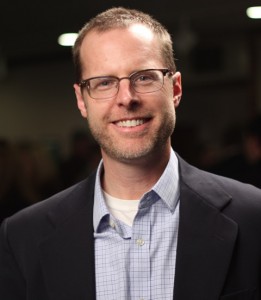By Smarty Guest Blogger Dr. Zachary White. Find more from Dr. White on his blog, The Unprepared Caregiver
We don’t think twice about insurance anymore—car insurance and health insurance are musts in our lives. But we also need a type of insurance most of us don’t think much about until we need it—the safety, solace, and strength we can draw upon from our social networks when we are in the midst of our greatest need. Social insurance doesn’t protect us from life, but it can provide us the assurance of being heard and understood and appreciated when we most need an audience.
Our smart phones organize people we know via our contacts’ list, but this is efficiency at its worst and least effective. For most of us, our contacts are organized according to alphabetical order, not need. People are organized in ways that help us easily access their names, not in ways that remind us who we can go to, lean on, and trust when we feel like we are falling apart. Instead of deferring to the alphabet, it’s more helpful to begin rethinking (and reordering) the people in our contact lists by the type of audience role they might fulfill when we are most in need:
Ventees
These people are ideal to share your deepest frustrations with. Frustrations need to be vented and this audience allows you to reveal your anger or disappointment or sadness in its purest form—without remorse. This audience won’t hold you hostage to appropriateness nor do they believe that what you say is what you think. Rather, ventees can provide you freedom to indulge in the moment without apology or shame because this audience knows that feelings are an expression of the moment, not a permanent state of mind.
Celebrators
Yes, we all need someone to celebrate with. Despite what we often think, not all people are ideal to share great news with. Who in your care crew can genuinely be joyful for your private accomplishments and small achievements? Who will allow you to revel in what most others take for granted—making it through the day, getting three hours of uninterrupted sleep, sipping a fresh cup of coffee. Celebrators are so vital to social well-being because they don’t take us out of our moments of joy by reminding us of what is next, or what has to be done, or what may loom in the future. Unlike most others, they allow us to simply be and enjoy the smallest of life’s pleasures even when life is challenging.
Off-Stagers
We all need someone we can share presence with in our darkest moments. Off-stagers allow us this privilege because, when we interact with them, we can stop pretending to be something other than what we are feeling. Off-stagers allow us to be with them in the midst of chaos whereas most others are only comfortable with us long before or long after the dust of chaos has been settled. With this audience, we can be un-make-upped, unkempt, out of sorts, and incoherent because we can rest assured knowing they appreciate the importance of our off-stage self as it is, not as the rest of the world needs us to be.
Laughers
We need people we can laugh with. This audience can be challenging to find or access because most others believe laugher in the midst of challenge is taboo. Laughers, however, are so important to our well being because they can get us out of ourselves long enough to help us see our experiences through new eyes. People who can find humor in the undesired—suffering, pain, challenge—aren’t scared about inviting us to react authentically and in ways beyond the clichéd requirements of sadness and tears. Although sadness and tears can be present, these people also make room for laughter as a response to life’s challenges.
Doers
Many people may fit in this category of providing tangible help in time of need, but there may be people in your social network whom are better than others. Quality doers do, they don’t over-promise what they are going to do. They show up when they say they will. They drive you and your loved one to the hospital and back. They bring food to you on a regular basis. Quality doers don’t need much from you. They don’t need long letters of gratitude or promises of immediate reciprocation that would only serve to make us feel guilty for their acts of goodness. They do because they can, and they understand that doing isn’t about them, it’s about a form of care they can provide.
Sense makers
These are people whom you can turn to help you make sense. They don’t fix or make your challenges go away. No, sense makers provide you an audience while you process your experiences. They are gray—not black and white—thinkers who have a higher tolerance for ambiguity than most others. They have a special capacity to allow you to share your thoughts without judgment, allowing you the benefit of hearing yourself talk through ideas out loud so you can process your thoughts beyond the running monologue in your own head. For some, sense making is through prayer. For others, sense making is accomplished through lists highlighting pros and cons. For others, sense is made through philosophy, shared presence, or shared touch. Whatever the approach, sense makers can provide the greatest gift of all—insurance against the sound of our own voices on endless repeat.
Everyone needs a care crew whom we can draw upon when we need social insurance against the inevitable interruptions of life. Some of us may still be looking to be heard or understood or embraced. Some of us might find that one or two individuals might fulfill all of these audience roles. Others might discover that the people we thought we might be able to call upon disappoint us while others whom we didn’t expect to help, rise to the occasion to provide support in ways we could never have imagined. As our needs change, so too do our needs for different types of support audiences. Life’s challenges are inefficient and messy and overwhelming. It’s time we begin rewriting our contact lists—not based on alphabetical order—but by their ability to support and interact with us when we are most need.
![]()
 About Dr. Zachary White:
About Dr. Zachary White:
Dr. Zachary White (@Zmwhite) is an Assistant Professor of Communication. He received his Ph.D. in communication from Purdue University. His academic research and teaching focus on how people manage meaning and communicate their experiences amidst high levels of ambiguity. He has published and presented academic research addressing health communication as encountered by medical providers, informal caregivers, family members, and organizational employees. He teaches university courses at the graduate and undergraduate level addressing topics including provider-patient communication, health and illness narratives, digital health literacy, interpersonal communication and relationship development on and offline, online social support and disclosure, the management of health-related disclosures in the workplace, and sense making amidst life transitions.


